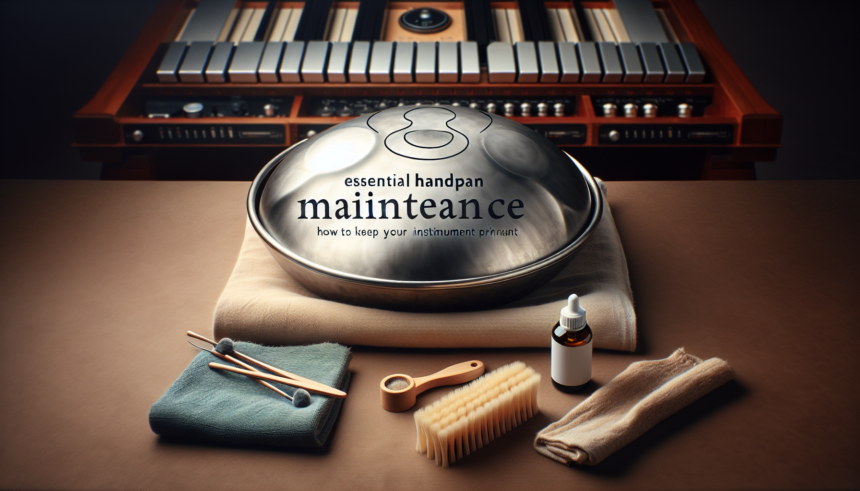The handpan, an enchanting and ethereal instrument, has captured the imagination of musicians around the world. Its mesmerizing sound and unique construction make it a valuable possession for any music enthusiast. Like any other musical instrument, a handpan requires proper care and maintenance to ensure it remains in pristine condition. Below are some essential tips and guidelines to follow for maintaining your handpan effectively.
Understanding Your Handpan
Before delving into maintenance tips, it’s important to understand the basic structure and materials of a handpan. Typically, handpans are made from nitrided steel or stainless steel, which are designed to produce resonant and harmonious sounds. The instrument is carefully crafted; any slight damage can affect its sound quality and structural integrity.
Regular Cleaning
Cleaning the Exterior
Cleaning your handpan regularly is crucial to preventing rust and maintaining its appearance. To clean the exterior:
- Use a soft, lint-free cloth to gently wipe the surface. This removes dust, dirt, and oils from your hands.
- For stubborn dirt or residue, dampen the cloth slightly with distilled water. Avoid using tap water as it can leave mineral deposits.
- Never use abrasive materials or harsh chemicals, as these can scratch or damage the finish.
Cleaning the Interior
While the exterior cleaning is straightforward, the interior requires a bit more care. Since the handpan is a closed shell instrument, dust and debris can accumulate inside over time:
- Gently turn the handpan upside down and shake it to dislodge any loose particles.
- A vacuum cleaner with a soft brush attachment can be carefully used to suck out any remaining dust.
- Do not use compressed air, as the high pressure can alter the instrument’s tuning.
Using Oils and Rust Prevention
Handpans, especially those made of nitrided steel, are susceptible to rust. Regular application of oil is vital for rust prevention and maintaining the instrument’s aesthetic and functional integrity:
- Use a high-quality, non-corrosive oil designed specifically for handpans. Popular choices include Phoenix Oil or Froglube CLP.
- Apply a thin layer of oil to the entire surface, both exterior and interior, using a soft cloth. This should be done every few weeks or whenever the instrument feels dry.
- Always wipe off any excess oil to avoid buildup.
Handling and Storage
Proper handling and storage are crucial for ensuring the longevity of your handpan:
- Always handle the handpan with clean, dry hands. Oils and dirt from your skin can contribute to rust over time.
- When not in use, store the handpan in a protective case to shield it from dust, moisture, and physical damage.
- Keep the instrument in a stable environment with low humidity and temperature variations. Excessive humidity can accelerate rusting, while extreme temperatures can affect tuning.
Avoiding Physical Damage
Due to its delicate nature, a handpan can easily be damaged by physical impacts:
- Avoid placing heavy objects on the handpan or bumping it against hard surfaces.
- Transport the handpan using a padded, durable case designed specifically for the instrument to prevent any accidental drops or knocks.
- Be mindful of your surroundings when playing or practicing. Ensure there’s ample space to avoid accidentally hitting nearby objects.
Tuning and Professional Servicing
Despite your best efforts, handpans may need professional tuning and servicing from time to time:
- Regularly check for any changes in sound quality. If the notes start to sound off, it might be time for a retuning.
- Consult a professional handpan tuner. Do not attempt to retune the instrument yourself unless you have the appropriate knowledge and experience, as this can lead to further damage.
- Proper maintenance includes periodic inspections by a professional to ensure all components are in good condition.
Environmental Considerations
The environment in which you store and play your handpan can significantly affect its lifespan:
- Keep the instrument away from direct sunlight, as prolonged exposure can cause material degradation.
- Avoid playing outdoors in harsh weather conditions such as rain or extreme cold, as this can lead to rust and tuning issues.
- If you need to play outdoors, ensure the handpan is adequately protected by a canopy or similar shelter.
Maintenance Schedule
Creating a maintenance schedule can help you stay on top of your handpan care routine:
- Daily: Wipe the surface with a soft cloth after playing to remove any oils and moisture.
- Weekly: Inspect the instrument for any signs of wear, rust, or damage. Clean the exterior more thoroughly if necessary.
- Monthly: Apply a fresh coat of oil to prevent rust and keep the surface conditioned.
- Annually: Consider a professional tuning and inspection to maintain optimal performance.
Conclusion
Maintaining a handpan requires dedication and care, but the reward is an instrument that continues to produce beautiful, harmonious sounds for years. By understanding the importance of regular cleaning, proper handling, oiling, tuning, and environmental considerations, you can ensure your handpan remains in pristine condition. Always remember that professional advice and services are invaluable for intricate tasks to prevent any unintentional damage to the instrument. Through consistent maintenance, your handpan will always be ready to provide Musical inspiration, whether for personal enjoyment or performances.
FAQs
1. How often should I oil my handpan?
It is recommended to oil your handpan every few weeks or whenever the surface begins to feel dry. Regular oiling helps to prevent rust and maintain the instrument’s luster.
2. Can I use regular household cleaners on my handpan?
No, you should avoid using household cleaners as they can contain abrasive chemicals that can damage the handpan’s surface. Stick to using a soft, lint-free cloth and distilled water for cleaning.
3. What should I do if my handpan gets wet?
If your handpan gets wet, immediately dry it off with a soft cloth and ensure it’s completely dry before storing it. Apply a layer of oil afterwards to protect against rust.
4. How can I tell if my handpan needs retuning?
Listen for any changes in sound quality or if the notes start to sound off-pitch. If you notice these signs, it’s best to consult a professional tuner to retune the instrument properly.
5. Can I store my handpan in a garage or basement?
Avoid storing your handpan in places with high humidity and temperature fluctuations like garages or basements. These conditions can accelerate rusting and affect the instrument’s tuning. Store it in a climate-controlled environment.





